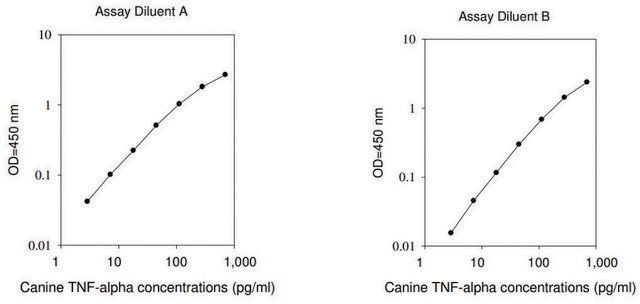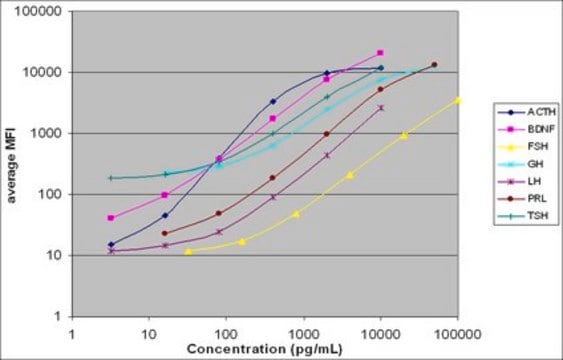RSHMAG-69K
MILLIPLEX® Rat Stress Hormone Magnetic Bead Panel - Endocrine Multiplex Assay
This MILLIPLEX MAP Rat Stress Hormone Magnetic Bead Panel is an Endocrine multiplex assay. The analytes available for this multiplex kit are: ACTH, Corticosterone, Melatonin.
About This Item
Productos recomendados
Nivel de calidad
reactividad de especies
rat
fabricante / nombre comercial
Milliplex®
assay range
accuracy: 61%
(Corticosterone)
accuracy: 83%
(ACTH)
sensitivity: 0.9 pg/mL
(ACTH)
sensitivity: 1.52 pg/mL
(Melatonin)
sensitivity: 2914 pg/mL
(Corticosterone)
standard curve range: 0.55-400 pg/mL
(Melatonin)
standard curve range: 1.4-1,000 pg/mL
(ACTH)
standard curve range: 686-500,000 pg/mL
(Corticosterone)
inter-assay cv: <15%
intra-assay cv: <10%
técnicas
multiplexing: suitable
método de detección
fluorometric (Luminex xMAP)
Condiciones de envío
wet ice
Descripción general
MILLIPLEX® Rat Stress Hormone Panel is a 3-plex kit to be used for the simultaneous quantification of any or all of the following analytes in serum, plasma, tissue/cell extracts or culture media samples: ACTH, corticosterone and/or melatonin. This kit uses a 96-well format, contains a lyophilized standard cocktail, two internal assay quality controls and can measure up to 38 samples in duplicate.
The Luminex® xMAP® platform uses a magnetic bead immunoassay format for ideal speed and sensitivity to quantitate multiple analytes simultaneously, dramatically improving productivity while conserving valuable sample volume.
Panel Type: Endocrine
Especificidad
This assay display insignificant cross-reactivity within the panel
Aplicación
- Analytes: ACTH, Corticosterone, Melatonin
- Recommended Sample Type: Rat serum, plasma, cell/tissue supernatants and lysates
- NOTE: For optimal assay performance of turbid serum and plasma samples an extraction protocol is provided.
- Recommended Sample Dilution: 25μL per well is used for the following: undiluted extracted serum or plasma; 1:4 non-extracted serum or plasma; cell/tissue culture samples may require dilution in an appropriate control medium.
- Assay Run Time: Overnight (16-18 hours) at 2-8°C
- Research Category: Endocrine
- Research Subcategory: Metabolism
Características y beneficios
Otras notas
Información legal
Cláusula de descargo de responsabilidad
Palabra de señalización
Danger
Frases de peligro
Clasificaciones de peligro
Acute Tox. 3 Dermal - Acute Tox. 4 Inhalation - Acute Tox. 4 Oral - Aquatic Chronic 2 - Eye Irrit. 2 - Skin Sens. 1
Código de clase de almacenamiento
6.1C - Combustible acute toxic Cat.3 / toxic compounds or compounds which causing chronic effects
Certificados de análisis (COA)
Busque Certificados de análisis (COA) introduciendo el número de lote del producto. Los números de lote se encuentran en la etiqueta del producto después de las palabras «Lot» o «Batch»
¿Ya tiene este producto?
Encuentre la documentación para los productos que ha comprado recientemente en la Biblioteca de documentos.
Contenido relacionado
Multiplex immunoassays save time and sample volume in metabolic syndrome research, providing comprehensive insights into related conditions.
Nuestro equipo de científicos tiene experiencia en todas las áreas de investigación: Ciencias de la vida, Ciencia de los materiales, Síntesis química, Cromatografía, Analítica y muchas otras.
Póngase en contacto con el Servicio técnico









